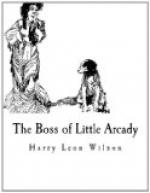Eustace went the mad pace. So did Arthur Updyke. It was rather to be expected of Arthur, however. His duties at the City Drug Store seemed to encourage a debonair lightness of conduct. He treated his blond ringlets assiduously from the stock of pomades; he was as fastidious about his fingernails as we might expect one to be in an environment of manicure implements and nail beautifiers; it was his privilege to make free with the varied assortment of perfumes—a privilege he forewent in no degree; his taste in tooth-powders was widely respected; and in moments of leisure, while he leaned upon a showcase awaiting custom, he was wont to draw a slender comb from an upper waistcoat pocket and pass it delicately through his small but perfect mustache. Naturally enough, it was said by the ladies of Little Arcady that Arthur’s attentions were never serious,—“except them he pays to himself!” Aunt Delia McCormick would often add, for that excellent woman was not above playing venomously with familiar words.
Also did G. Brown and Creston Fancett go the same mad pace. These four were filled with distrust of one another, but as they composed our male quartette, they would gather late on summer nights and conduct themselves in a manner to make me wish that old Azariah Prouse’s peculiar belief as to house structure might have included a sound-proof fence about his premises. For, on the insufficient stretch of lawn between that house and my own, the four rivals sang serenades.
“She sleeps—my lady sleeps,” they sang, with a volume that seemed bound to insure their inaccuracy as to the lady, and which assuredly left them in the wrong as to her mother’s attorney—if their song meant in the least to report conditions at large. As this was, however, the one occasion when they felt that none of the four had any advantage over his fellows, they made the most of it. Then, in the dead of night, I would be very sorry that I had not counselled the mother of Eustace Eubanks to send him around the world on a slow sailing ship; for it was his voice, even in songs of sleep, that rendered this salutary exercise most difficult.
On one of these wakeful summer nights, however, I received a queer little shock. Perhaps I half dreamed it in some fugitive moment of half sleep; but it was as if I were again an awkward, silent boy, worshipping a girl new to the school, a girl who wore two long yellow braids. I worshipped her from afar so that she saw me not, being occupied with many adorers less timid, who made nothing of snatching a hair ribbon. But the face in that instant of dream was the face of Miss Katharine Lansdale, and coupled with the vision was a prescience that in some later life I should again look back and see myself as now, a grown but awkward boy, still holding aloof—still adoring from some remote background while other and bolder gallants captured trophies and lightly carolled their serenades. It seemed like borrowing trouble




